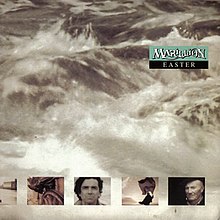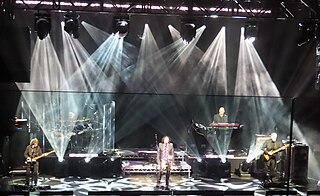
Marillion are a British rock band, formed in Aylesbury, Buckinghamshire, in 1979. They emerged from the post-punk music scene in Britain and existed as a bridge between the styles of punk rock and classic progressive rock, becoming the most commercially successful neo-prog band of the 1980s.

Brave is the seventh studio album by Marillion, released in 1994. It charted at number 10 on the UK Albums Chart, being the last of the band's albums to reach the Top 10 in the United Kingdom until F E A R reached number 4 in 2016.
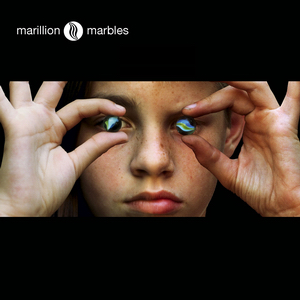
Marbles is the 13th studio album from rock band Marillion, released in 2004. Unlike their previous studio album, Anoraknophobia (2001), which was financed largely by a preorder campaign, the band funded the recording, and it was the publicity campaign that fans financed for the album. Those fans who pre-ordered the album received an exclusive 2-CD "Deluxe Campaign Edition" with a booklet containing the names of everyone who pre-ordered before a certain date. The public release date of the retail single-CD version of the album was 3 May 2004 while a plain 2-CD version was made available from the band's website. A limited edition was released on white multicoloured vinyl by Racket Records on 13 November 2006.

Seasons End is the fifth studio album by British neo-prog band Marillion, released in 1989. The album was the first to feature current lead vocalist Steve Hogarth, following the departure of former vocalist Fish in late 1988. It reached number 7 on the UK Albums Chart.

A Singles Collection is a compilation album of Marillion singles from both the Fish era and the Steve Hogarth era, celebrating the band's ten-year jubilee. It includes the band's six most successful singles of the Fish era, plus all six Steve Hogarth singles up to that year.

Afraid of Sunlight is Marillion's eighth studio album, released in 1995. It was their last for EMI.

Best of Both Worlds is a two-disc compilation album by British neo-prog band Marillion released in 1997 by EMI Records, who the band had been signed to from their debut in 1982 until being dropped in 1995. The title refers to Marillion's two distinct "eras" with lead singers Fish (1980—1988) and Steve Hogarth. By the time this compilation was released, both line-ups had recorded four studio albums each. The second best-of since the 14-track one-disc compilation A Singles Collection from 1992, this one additionally contains material from Brave (1994) and Afraid of Sunlight (1996). Two different covers were created for the compilation, one by Mark Wilkinson, who had worked for the band during the Fish years, and one by Bill Smith Studio, who took over after Fish's and Wilkinson's departure. The booklet was printed so that either of the covers could be displayed in the jewel case according to personal preference. The track list, comprising 29 songs, was put together by Lucy Jordache, then the manager responsible for the band in EMI, in close collaboration with the band's fans' mailing list, "Freaks". Jordache also motivated singers Fish and Hogarth to contribute liner notes—at a time when both camps were not yet on friendly terms again—by telling each of them the other had already agreed to do so.

Radiation is the tenth studio album by the British neo-prog band Marillion, released in 1998. Recorded at The Racket Club between November 1997 and June 1998, it was co-produced and mixed by Stewart Every. The album was remixed by Michael Hunter in September to November 2012 and a reissued remastered version was released in 2013.

"Assassing" is a song by the British neo-prog band Marillion. It was the second single from their second studio album, Fugazi (1984). The single reached no. 22 on the UK singles charts in May 1984. The 7" single's title track is a heavily edited version of the first track on Fugazi, with a length of 03:39 as opposed to the album version with 07:01. The B-side is the non-album track "Cinderella Search".
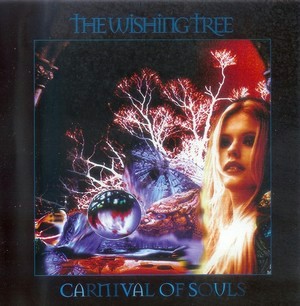
Carnival of Souls is the title of the first album by The Wishing Tree, a project by Marillion's guitarist Steve Rothery and singer Hannah Stobart. It was originally released in 1996 on Steve Rothery's short-lived label Dorian Music and was re-released in 2001 on Marillion's label Racket Records. The new version includes some bonus material, two live videos and two demos of previously unreleased songs.

Anorak in the UK is a live album by Marillion released in April 2002 and documenting the previous year's Anoraknophobia tour. Most songs were recorded on three nights in May 2001 using a mobile studio, while two tracks were recorded in front of a small private audience at the band's own studio after the October leg of the tour. The album was released in two versions: A two-disc set only distributed via Marillion's own mail-order business, and a one-disc retail edition distributed by EMI. Under this deal, EMI required the band to provide one exclusive song on the retail edition that would not be found on the two-disc version. The band chose "Easter" from 1989, as it is available on several previous official and semi-official live albums and therefore would not "force" fans to purchase both versions of the album. Anorak in the UK is Marillion's first official retail live album since Made Again (1996), and the second with Steve Hogarth. The title takes its cues from the Sex Pistols single "Anarchy in the U.K." and, self-mockingly, the British slang term anorak often applied to Marillion fans. The cover shows a crowd consisting of "Barry" featured on Anoraknophobia.

The Best of Marillion is a compilation album from the band Marillion. The songs come from both the Fish era and Steve Hogarth era of the band. It was released in mainland Europe only.

Less Is More is an acoustic studio album by Marillion, released on the band's own label on 2 October 2009. A retail version is distributed by Edel Music. The band's 16th studio album, it contains re-arranged songs from the period that Steve Hogarth has been their singer plus the previously unreleased track, "It's Not Your Fault". Despite some positive reviews, the album did not chart in the UK.

"Heart of Lothian" is a song by British neo-prog band Marillion. It is the fifth track on the 1985 concept album Misplaced Childhood. The song was released as the third single from Misplaced Childhood on 18 November 1985 in the UK, the Netherlands, West Germany, Canada, South Africa and Australia. "Heart of Lothian" became the third Top 30 UK single from Misplaced Childhood, peaking at number 29. The song also peaked at number 51 on the German singles chart.

"Hooks in You" is the first single from British rock band Marillion's fifth album Seasons End, released in 1989. It was the first single to feature lead singer Steve Hogarth, who joined the band the same year, replacing Fish.

"The Uninvited Guest" is the second single from English band Marillion's fifth studio album Seasons End, released in 1989. It was the band's first single since their debut "Market Square Heroes" in 1982 that did not enter the UK Singles Chart's top 40, peaking at no. 53.
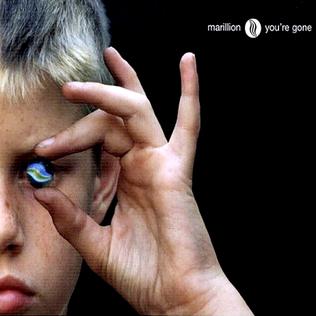
You're Gone is the lead single from Marillion's 13th studio album Marbles, released in 2004. The song marked a comeback for the band, reaching number 7 on the UK Singles Chart and becoming their first top ten hit since 1987's "Incommunicado". It also made number 8 on the Dutch Top 40.

"Don't Hurt Yourself" is the second single from Marillion's 13th studio album Marbles, released on 12 July 2004. Following the band's comeback to the upper regions of the UK Singles Chart with the previous single "You're Gone" in May, it reached number 16, becoming their second-highest charting hit since 1987's "Incommunicado". As with "You're Gone", the chart success of this single was largely based on making it available in two formats and encouraging fans to buy them simultaneously in the first week after their release. It also reached a top 40 position in the Dutch charts.
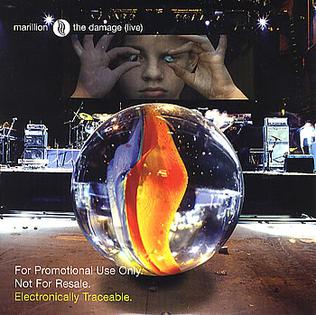
"The Damage" is a song by British neo-prog band Marillion which appeared on their 13th studio album, Marbles, released in May 2004. In October 2005, a one-disc live album containing a subset of the full two-disc studio version entitled Marbles Live was released to retail shops in the UK. The recording was made at the London Astoria in July 2004. To promote this album, the track "The Damage" was made available as a digital download; it is thus the third song to be released from Marbles and the only track to be released from Marbles Live. Download-only releases were not yet eligible to chart on the UK Singles Chart at the time, but the single did reach #2 on the UK Official Download Chart. There was no physical release available, but a one-track CD version was sent out as a promo.
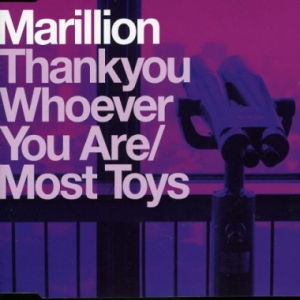
"Thankyou Whoever You Are" and "Most Toys" are songs recorded by British neo-prog band Marillion which appeared on their 14th studio album, Somewhere Else. They were released on a double A-side single in the United Kingdom and in the Netherlands in June 2007. "Thankyou" is a slow, slightly orchestral ballad arranged in the band's trademark style. In stark contrast, "Most Toys" is simple, rocky and fast, with an anti-consumerism message. It has a running time of 2:49, one of the band's shortest recordings to date, along with the musically similar "Hooks in You" from 1989).
